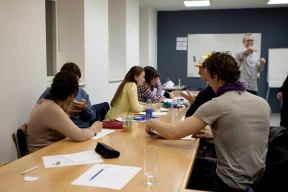While the rest of humanity celebrates the passage of 2016 and start of a new year, as ecologists we are not quite halfway through our fiscal year. For northern-hemispherists, field work wraps up in August, we spend September learning to take regular showers and don reputable clothing, then turn our attention to the queue of grant deadlines that peak in January and trail off toward the spring. Our seasons are out of sync with the rest of the world (“No eggnog, thanks – am finishing a proposal later tonight”), which means planning ahead is fundamental not only for success but arguably for survival.
One of the deadlines that creeps up every year is the NSF Graduate Research Program Fellowship (GRFP), that highly competitive but career-changing opportunity that funds several thousand graduate students across all disciplines in the United States each year. Even if you aren’t a graduate student, chances are you know or are advising students who may apply for the GRFP this October. We wrote a paper for those eyeing this opportunity, with the specific aim of helping students collect themselves (literally) to learn proposal writing skills. In “The benefits of workshopping graduate fellowships: a how-to guide for graduate students and early career scientists”, we lay out step-by-step guidelines by which graduate students (or advisors) can organize grant-writing workshops, leveraging the knowledge and skills at their institution toward the most competitive applications possible.
The paper is based on 4+ years’ experience implementing this workshop at UW’s School of Aquatic and Fishery Sciences. It started as a brainchild of two labmates, both of whom had learned the immense value of mentorship in writing their own GRFP proposals: the workshop grew organically when we found ourselves overwhelmed with requests for help from other students and giving the same advice (often at the last minute). Knowing that there was much to be learned simply from the process of writing proposals and essays, and that students were putting in dozens if not hundreds of hours into applications, we decided to organize an optional graduate course to support applicants.
The course ultimately evolved to a non-credit workshop with a schedule that can flex based on GRFP deadlines each year, but the fundamental elements have remained the same: a student-led course around proposal writing with mentorship at its core. The workshop provides benefits such as fellowship-specific advice and a timeline for writing, but the component that students overwhelmingly value the most is being part of a small group that includes senior graduate students (often previous NSF Fellows) and post-docs for providing peer-reviews of essay drafts. This structure also spreads out the work in reviewing essays so that no one person is overly burdened, keeping the workshop sustainable over time.

The road less traveled – proposal writing with support of peers and mentors helps clarify ideas, improves writing, and teaches the fine art of peer review. Plus it’s just more fun this way. Photo: Jirka Matousek.
Although it was initially prompted by a desire to harness some of the annual GRFP chaos for a greater good, the benefits to workshopping proposal writing for graduate students have proved immense. Applicants gain early exposure and practical experience in grantwriting, collaboration, and peer-review, skills that typically are learned toward the end of graduate experiences (if at all). The workshop structure also helps level the playing field for applicants, who may have inconsistent support that depends on who happens to be in their lab at the time, or, in the case of post-baccalaureates, if they have any connections to help support their applications. Lastly, while GRFP applications are a painstaking process, the group approach can definitely help boost motivation and confidence: when we surveyed participants about workshop components, they ranked “Support of my peers” as highly as “Expert panels”.
For students or faculty who might like to see something like this in their department, now is the perfect time to start putting the wheels in motion for a typical fall GRFP deadline (deadlines this year are Oct 23-27, 2017). Even without organizing a workshop, the article also has plenty of advice for individual students contemplating a GRFP application or faculty who mentor students every year in crafting applications. Happy writing!

You must be logged in to post a comment.